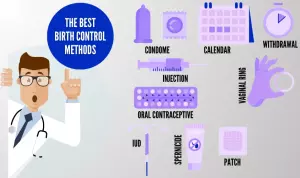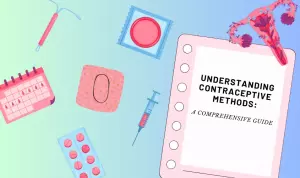
The Best Birth Control Methods

Choosing Birth Control: Tips for Finding the Right Fit for You

Emergency Contraception: What Are Your Options?

What Are Contraceptive Side Effects?

Understanding Contraceptive Methods: A Comprehensive Guide

Oral Contraceptives: Proper Use and Guidelines
Birth Control Options
Birth control is an essential part of managing your reproductive health and planning for the future. Whether you’re looking to prevent pregnancy, manage medical conditions, or gain more control over your body, understanding the various birth control options is crucial. With so many methods available, it can feel overwhelming to choose the right one. This guide will help you navigate the different types of birth control, understand how they work, and decide which option suits your lifestyle, health needs, and goals.
What is Birth Control?
Birth control, also known as contraception, refers to methods, devices, or medications used to prevent pregnancy. It can also serve other purposes, such as regulating menstrual cycles, reducing period pain, or managing hormonal conditions like polycystic ovary syndrome (PCOS) and endometriosis. Choosing the right form of birth control can give you confidence and control over your reproductive health.
Types of Birth Control
There are several types of birth control, each with its own benefits, risks, and level of effectiveness. Here’s a breakdown of the main categories:
Hormonal Birth Control: This includes methods like the pill, patch, vaginal ring, and hormonal IUDs. These work by preventing ovulation or thickening cervical mucus to block sperm.
Barrier Methods: These include condoms (male and female), diaphragms, and cervical caps. They physically prevent sperm from reaching the egg.
Intrauterine Devices (IUDs): IUDs are small, T-shaped devices inserted into the uterus. They come in hormonal and non-hormonal (copper) forms.
Natural Methods: These involve tracking your menstrual cycle to avoid intercourse on fertile days. Methods include the calendar method, basal body temperature tracking, and cervical mucus observation.
Sterilization: Permanent methods like tubal ligation or vasectomy are suitable for those who do not want children in the future.
Emergency Contraception: Pills like Plan B or IUDs used after unprotected intercourse to prevent pregnancy.
How to Choose the Right Birth Control
The best birth control option for you depends on several factors, including your health, age, sexual activity, and long-term plans. Here are some things to consider:
Your health: Certain medical conditions or medications can influence which methods are safe and effective for you.
Your lifestyle: If you’re forgetful, daily pills might not be ideal. Long-term methods like IUDs or implants may suit you better.
Your goals: Are you planning to have children soon, or do you want long-term protection? This will guide your decision.
Your comfort: Some people prefer methods with minimal maintenance, while others feel more comfortable using barrier methods.
It’s always a good idea to consult a healthcare provider. They can help you weigh the pros and cons of each method and recommend options based on your unique needs.
Benefits and Drawbacks of Popular Methods
Each birth control method comes with advantages and potential drawbacks. Here’s a closer look:
Hormonal Methods: Highly effective when used correctly, they can also regulate periods and reduce acne. However, they may cause side effects like mood changes or nausea.
Barrier Methods: These provide protection against sexually transmitted infections (STIs) and are hormone-free. They require consistent use and can sometimes fail if not used properly.
IUDs: Long-lasting and highly effective, IUDs require minimal effort after insertion. The insertion process may cause discomfort, and there’s a small risk of complications.
Natural Methods: These are free of cost and hormones but require careful tracking and are less reliable than other methods.
Sterilization: Permanent and highly effective but not reversible in most cases, making it unsuitable for those who may want children later.
Emergency Contraception
Emergency contraception is a safe and effective way to prevent pregnancy after unprotected sex or contraceptive failure (like a broken condom). Options include emergency contraceptive pills and copper IUDs. It’s important to use these methods as soon as possible for maximum effectiveness. Keep in mind that emergency contraception is not a replacement for regular birth control methods and should only be used in emergencies.
Common Myths About Birth Control
There are many misconceptions about contraception that can make it harder to make informed choices. Let’s debunk some of the most common myths:
Myth: Birth control pills cause infertility.
Fact: Fertility usually returns quickly after stopping the pill.
Myth: IUDs are only for people who have had children.
Fact: IUDs are safe and effective for anyone, regardless of whether they’ve had children.
Myth: Condoms are 100% effective.
Fact: Condoms are highly effective when used correctly but are not foolproof.
Take Control of Your Reproductive Health
Choosing a birth control method is a personal decision that should be based on your unique needs and circumstances. By learning about the different options available, you can make an informed choice that aligns with your health, lifestyle, and goals. Remember, your healthcare provider is a valuable resource for answering questions, addressing concerns, and helping you find the best method for your situation.
Empower yourself by understanding your options and taking control of your reproductive health. Whether you’re just starting to explore birth control or looking to switch methods, knowledge is the key to making confident, informed decisions.











